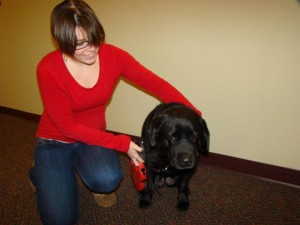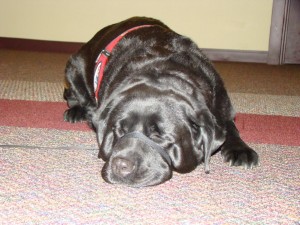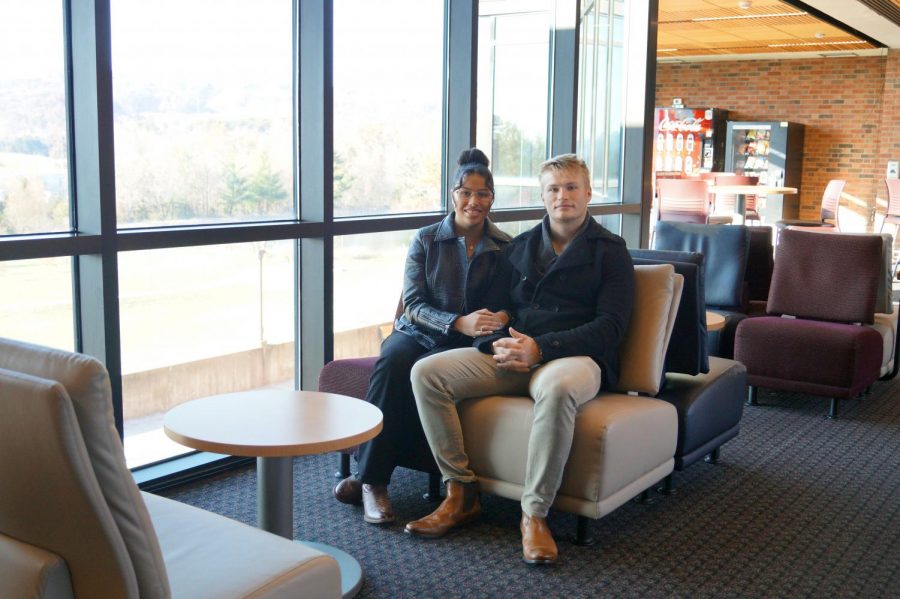Mary Whitlock, psychology junior, lives in Orchard Lodge with four roommates. One of them, Eavie, is not like the others.
Eavie is Whitlock’s service dog – one of the few pets seen on campus.
Whitlock received Eavie during her freshman year of high school. At the time, she was suffering from brief, but frequent, epileptic seizures, which would generally last around 30 seconds.
“I once had 86 in one day,” Whitlock said.
For that reason, she said she wanted to have someone with her, but no longer wanted her parents to always be at her side. She decided to look into getting a service dog. Soon after, Eavie joined the Whitlock family.

Today, Whitlock no longer has seizures to the same degree.
“I wouldn’t even call them ‘seizures’ anymore,” she said. “My head will tilt a little and it’ll be over. It only happens about once or twice a month.”
Though she no longer has seizures, Whitlock still views Eavie as an invaluable companion.
“I don’t know what I’d do without Eavie,” she said.
Ever since she was young, Whitlock has had to cope with seizures. They were partial, or focal, seizures, which primarily affected the left side of her body. She said more intense ones would affect the right side of her body as well.
She has taken medication for seizures from an early age. She also went through two brain resections as a child, in which the brain tissue responsible for seizures was removed.
“My first brain resection happened when I was only five years old,” she said.
Despite the measures taken to reduce the seizures, they continued to persist, becoming more severe as she entered adolescence. It was at this time that Whitlock made the decision to get a service dog.
She began going to training classes provided by Paws With Purpose, a non-profit organization based in Louisville. There she was assigned Eavie, an English Labrador retriever.
“They placed the dogs with people who have similar personalities,” she said. “Eavie is laid-back, like me.”
In the training classes, service dogs are taught how to properly assist their new owners. Whitlock said that it is a time-consuming process.
“I had to miss most of my freshman year because I had to go to her training classes,” she said.
Eavie was trained primarily to provide support to Whitlock and help her with seizure-related anxiety.
“She was trained to lay down at my right side when I had seizures,” she said. “She’s mainly there for support, as a companion.”
Eavie – who Whitlock refers to as “very smart” – has other skills as well. At restaurants, she is trained to lie down under the table, where she can be safely out of the server’s way. She is even capable of helping with laundry.
“I could just tell her ‘Eavie, get me a washcloth,’ and she’d do it,” Whitlock said.

After graduating from high school, Whitlock set her sights on college, and was drawn to IU Southeast.
“It’s small, and I like the student-to-teacher ratio,” she said. “I also don’t like big crowds. They make me particularly nervous because of my seizures.”
She began as a journalism major, but soon switched to special education.
“I loved it a lot,” she said. “I really like helping kids.”
Her aunt inspired her to switch majors once again, however.
“My aunt is a therapist and talks on the phone with people in the military and people with PTSD,” she said. “That got me interested in it, and now I’m a psychology major.”
She has lived on campus throughout her time at IU Southeast.
While pets usually are not found in the school’s residence halls, Whitlock’s roommates have embraced Eavie’s company.
Reba Potter, graphic design freshman, said she enjoys living with Eavie.
“Being a person who loves animals, I’m glad to see Eavie almost everyday,” Potter said. “She loves being petted, and she loves the blue rug in my room.”
After Whitlock’s first semester as a sophomore, she had to take time off from school, in order to undergo a third brain resection.
“They actually put electrodes in my brain, so they could tell where the seizures were,” she said. Since that surgery in 2010, her seizures have become much less prominent.
“I was actually seizure-free for a while,” she said. “They came back just slightly, but I don’t have to worry about them anymore.”
She said she feels Eavie was crucial during the healing process and wants to someday help others get service dogs.
“I’d like to work with disaster relief, taking dogs to people in trouble or in need,” she said.
After graduating, she also wants to follow in her aunt’s footsteps and become a license-certifies social worker. She still wants to work with kids, though.
“I’d like to listen to and help kids who’ve been in traumatic events,” she said. “I’d also like to help people who have had disabilities.”
In the meantime, she enjoys spreading positivity with Eavie.
“I like to tell people that, if they’re having a bad day, they can come visit Eavie,” she said.
By NIC BRITTON
Staff
nmbritto@umail.iu.edu




